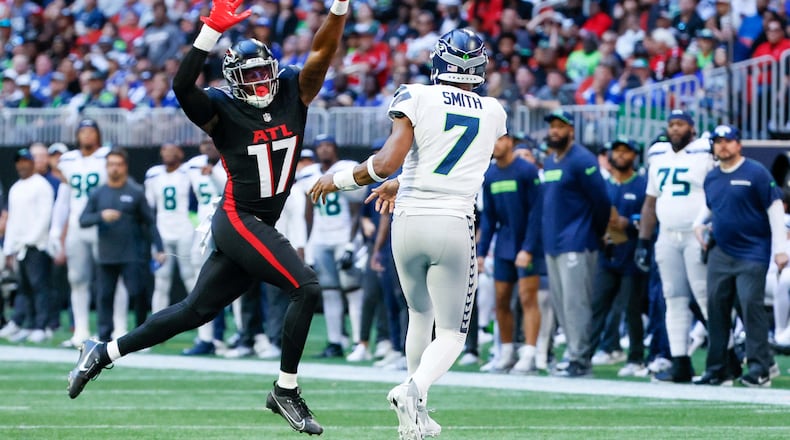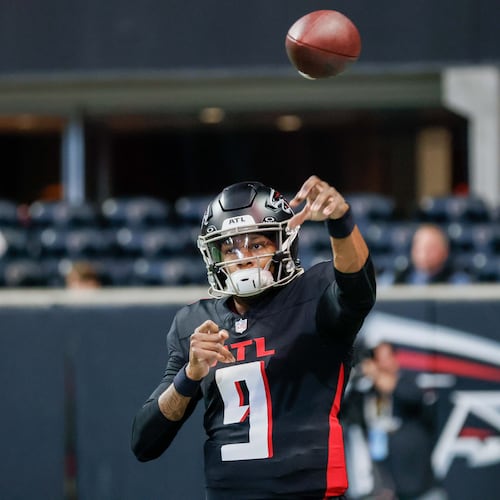There was insufficient preparation, missed plays and poor execution all across the board for the Falcons Sunday. You don’t lose 34-14 on account of one facet of the game.
But the Falcons’ inability to effectively pressure the quarterback has become the problem that is impossible to avoid. The inability of their defensive front to make life difficult for Seahawks quarterback Geno Smith may not have been the leading contributor of the loss, but it was surely on the list.
In two of the defining sequences of the game, the failure to sack Smith or force him into incompletions helped induce the Falcons’ defeat, ending their happy three-game winning streak in a conference loss at Mercedes-Benz Stadium.
Normally, when a team has a trouble spot, coaches will downplay the matter. Coach Raheem Morris is well past that point with his pass rush.
“Yes, we have to hit the quarterback in a timely fashion,” he said. “We have to get him on the ground when we send people. Can’t let him scramble around and do some of those things.”
Smith, whose pass protection has been among the leakiest in the NFL (3.2 sacks per game before Sunday), was taken down once by the Falcons (by outside linebacker James Smith-Williams in the second quarter). As Morris observed, Smith was able to either get the ball off in time or scramble away from pressure to complete passes or pick up yards on the ground. Smith finished 18-for-28 for 207 yards with two touchdowns and no interceptions. The Falcons had allowed only nine pass plays of 20 yards or more before Sunday in six games. Smith chalked up four and the offense picked up another on a gadget play.
It’s not the end of the world for the Falcons. They reached 4-2 with the same pass-rush flaw. Sunday, the Falcons were done in because it was only one of many facets that were not operating effectively. But Morris and general manager Terry Fontenot must continue to consider what the team’s ceiling is if the situation doesn’t change with defensive coordinator Jimmy Lake’s unit.
With six sacks in seven games, the Falcons are now averaging .86 sacks per game. If they were to keep that pace, they would finish with 15 sacks, which would be the lowest season total for an NFL team since 2018, per Stathead.
Since 2000, the fewest number of sacks by a team that won double-digit games is 19. And the season outcomes for nearly all teams that even reached 25 sacks is grim. It’s not to say that the Falcons can’t win with ineffective pass-rush pressure. But it means that a lot of other parts of the operation have to function at high efficiency to overcome it. The margin for error reduces, and games like Sunday’s become more likely.
It was thought that the preseason trade for four-time Pro Bowl edge rusher Matthew Judon would be a difference maker for the Falcons. Judon started hot with 1.5 sacks and two quarterback hits in the Falcons’ first two games. He has not brought down a quarterback and had one QB hit since, including Sunday.
When the game was on the line Sunday, he and his teammates could not deliver.
Moment No. 1 – The Seahawks took the ball with 1:07 left in the second quarter on their 32-yard line with a 10-7 lead. The Falcons were getting the ball first to start the second half, so a stop would give them a chance to take the lead in the third quarter.
But throwing from clean pockets in clear passing situations, Smith completed five of five passes on the drive for 78 yards. (The Falcons did have one win, when Smith threw the ball away for intentional grounding as defensive lineman Demone Harris tried to bring him down.) Down to the last 10 seconds in the half, he finished the drive with a 31-yard strike to wide receiver D.K. Metcalf on a third-and-15.
“(The pass protection) played a great role all day,” Smith said. “I thought all day, the protection was great.”
Smith made his first three completions on that drive with Judon unable to get past Seahawks rookie right tackle Michael Jerrell. Someday, Jerrell may be an All-Pro who should consistently get the better of a player like Judon.
On Sunday, though, he was a rookie sixth-rounder from a Division II college making his NFL starting debut. He was a player that Judon should have had a clear advantage against.
Interestingly, Judon was taken out after those first three snaps and did not return in the series, even for the touchdown pass after both teams had called timeout.
“How about Mike Jerrell stepping in, a rookie sixth-rounder, stepping in and playing some big-time football (Sunday)?” Smith said. “I thought he did a great job.”
Moment No. 2 – The Seahawks offense took the field for their first drive of the second half after the Falcons had used up nearly half the third quarter for a 79-yard touchdown drive to cut the lead to 17-14.
The Falcons, who had yet to lead in the game, could position themselves to take the lead with a stop. But Seattle answered with a nine-play, 63-yard touchdown drive. On a third-and-9, the Falcons failed to keep Smith in the pocket, allowing him to scramble eight yards to set up a fourth-and-1 that the Seahawks converted. On a third-and-5, Smith first had five seconds to throw (before throwing incomplete), but then Harris was called for roughing the passer to extend the drive.
On the next play, a first-and-10 from the Falcons 17, edge rusher Arnold Ebiketie beat the rookie Jerrell off the snap, but Smith eluded him in the pocket. With space and time, Smith connected with running back Kenneth Walker III, who made an acrobatic catch for a touchdown and a 24-14 lead.
“I felt like the guys battled (Sunday),” Seahawks coach (and Centennial grad) Mike Macdonald said. “I think Atlanta had a sack or two – I’m not sure of the stats – but Geno was able to move and groove in the pocket if they were able to get immediate pressure. Something to build on, for sure.”
The Falcons have bigger problems than opposing coaches busting out rhymes in the postgame news conference. But, in a sense, probably not many.
About the Author
Keep Reading
The Latest
Featured




